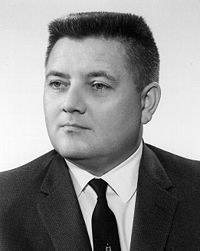Edwin Thompson Jaynes
E. T. Jaynes | |
|---|---|
 Edwin Thompson Jaynes, c. 1960. | |
| Born | July 5, 1922 |
| Died | April 30, 1998 (aged 75) |
| Education | Cornell College Princeton University |
| Known for | Maximum entropy thermodynamics Bayesian theory Jaynes–Cummings model |
| Scientific career | |
| Fields | Physicist |
| Institutions | Washington University in St. Louis |
| Thesis | An electronic theory of ferroelectricity (1948) |
| Doctoral advisor | Eugene Wigner |
| Doctoral students | Fred Cummings Joseph H. Eberly Douglas James Scalapino |

Edwin Thompson Jaynes (July 5, 1922 – April 30,[1] 1998) was the Wayman Crow Distinguished Professor of Physics at Washington University in St. Louis. He wrote extensively on statistical mechanics and on foundations of probability and statistical inference, initiating in 1957 the maximum entropy interpretation of thermodynamics[2][3] as being a particular application of more general Bayesian/information theory techniques (although he argued this was already implicit in the works of Josiah Willard Gibbs). Jaynes strongly promoted the interpretation of probability theory as an extension of logic.
In 1963, together with his doctoral student Fred Cummings, he modeled the evolution of a two-level atom in an electromagnetic field, in a fully quantized way.[4] This model is known as the Jaynes–Cummings model.
A particular focus of his work was the construction of logical principles for assigning prior probability distributions; see the principle of maximum entropy, the principle of maximum caliber, the principle of transformation groups[5][6] and Laplace's principle of indifference. Other contributions include the mind projection fallacy.
Jaynes' book, Probability Theory: The Logic of Science (2003) gathers various threads of modern thinking about Bayesian probability and statistical inference, develops the notion of probability theory as extended logic, and contrasts the advantages of Bayesian techniques with the results of other approaches. This book, which he dedicated to Harold Jeffreys, was published posthumously in 2003 (from an incomplete manuscript that was edited by Larry Bretthorst).
Other of his doctoral students included Joseph H. Eberly and Douglas James Scalapino.[4]
See also
[edit]References
[edit]- ^ Clark J.W.; Norberg R.E.; Bretthorst G.L. (January 2000). "Edwin Thompson Jaynes". Physics Today. 53 (1): 71. Bibcode:2000PhT....53a..71.. doi:10.1063/1.882948. Archived from the original on 2007-08-06.
- ^ Jaynes, E.T. (1957). "Information theory and statistical mechanics" (PDF). Physical Review. 106 (4): 620–630. Bibcode:1957PhRv..106..620J. doi:10.1103/PhysRev.106.620. S2CID 17870175.
- ^ — (1957). "Information theory and statistical mechanics II" (PDF). Physical Review. 108 (2): 171–190. Bibcode:1957PhRv..108..171J. doi:10.1103/PhysRev.108.171.
- ^ a b Cummings, Frederick W (2013-11-01). "Reminiscing about thesis work with E T Jaynes at Stanford in the 1950s". Journal of Physics B: Atomic, Molecular and Optical Physics. 46 (22): 220202. doi:10.1088/0953-4075/46/22/220202. ISSN 0953-4075.
- ^ — (September 1968). "Prior Probabilities" (PDF). IEEE Transactions on Systems Science and Cybernetics. 4 (3): 227–241. doi:10.1109/TSSC.1968.300117.
- ^ — (December 1973). "The Well-Posed Problem" (PDF). Found. Phys. 3 (4): 477–492. Bibcode:1973FoPh....3..477J. doi:10.1007/BF00709116. S2CID 2380040.
External links
[edit]- Edwin Thompson Jaynes at the Mathematics Genealogy Project
- Edwin Thompson Jaynes. Probability Theory: The Logic of Science. Cambridge University Press, (2003). ISBN 0-521-59271-2.
- Early (1994) version (fragmentary) of Probability Theory: The Logic of Science. Book no longer downloadable for copyright reasons.
- A comprehensive web page on E. T. Jaynes's life and work.
- ET Jaynes' obituary at Washington University
- http://bayes.wustl.edu/etj/articles/entropy.concentration.pdf Jaynes' analysis of Rudolph Wolf's dice data
Lua error in Module:Navbox at line 192: attempt to concatenate field 'argHash' (a nil value).
- 1922 births
- 1998 deaths
- American agnostics
- 20th-century American physicists
- American statisticians
- Washington University in St. Louis mathematicians
- Washington University in St. Louis physicists
- Scientists from Missouri
- 20th-century American mathematicians
- Statistical physicists
- Information theorists
- American probability theorists
- Cornell College alumni
- Bayesian statisticians
- Philosophers of probability
